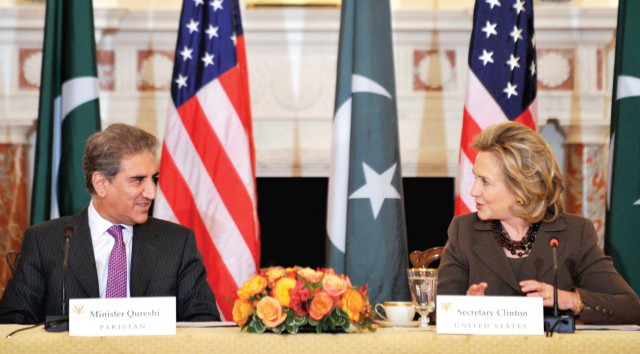US woos Pakistan with $2b military package
Clinton praises Islamabad's effort against militants.

The United States announced $2 billion in military aid for Pakistan on Friday as the two countries sought to dispel doubts about Islamabad’s commitment to uprooting insurgents from safe havens on its soil.
“The United States has no stronger partner when it comes to counterterrorism efforts against the extremists who threaten us both than Pakistan,” Secretary of State Hillary Clinton said.
The five-year military aid package, which must be approved by Congress, would complement $7.5 billion in civilian assistance already cleared by US lawmakers. Foreign Minister Shah Mehmood Qureshi rejected naysayers who argue that Islamabad’s heart is not in the fight against the insurgents.
“There are still tongue-in-cheek comments, even in this capital, about Pakistan’s heart not really being in this fight. I do not know what greater evidence to offer than the blood of our people,” Qureshi said, sitting next to Clinton. “Prophets of doom are back in business painting doomsday scenarios about our alliance. They are dead wrong,” he said.
Announcement of the military assistance, for the years 2012 to 2016, came at the formal opening of the third round of the US-Pakistan Strategic Dialogue, a series of talks to expand relations beyond the fight against insurgents.
Clinton said 13 working groups focusing on issues from water to energy had agreed on plans to immunise 90 per cent of Pakistani schoolchildren, improve electricity supplies and help farming families get back on their feet after devastating floods in August.
But looming over the talks is the nine-year-old war in Afghanistan and the fight against al Qaeda and other extremist groups along the Afghanistan-Pakistan border that have strained relations between Islamabad and Washington. The Obama administration has pointedly pressed Pakistan for more aggressive action against safe havens in North Waziristan, saying in a recent report to Congress that Pakistani forces had avoided direct contact with al Qaeda and related militants, in part for political reasons.
Stepped up attacks in the region by US drone aircraft have aggravated public opinion in Pakistan and relations deteriorated after a cross-border helicopter incursion killed two Pakistani border guards in Kurram Agency.
The incident prompted Pakistan to close a border crossing near the Khyber Pass to Nato supply convoys for 10 days until apologies were made by US and Nato officials. US Defence Secretary Robert Gates apologised again for the incident when he met Army chief General Ashfaq Parvez Kayani earlier this week.
But US officials continue to press Pakistan for more action and express growing concerns about the possibility of an attack on US soil plotted by Pakistan-based groups, similar to the failed bombing in New York’s Times Square this year.
Clinton told officials at the plenary session of the strategic dialogue on Friday that the two sides had “productive discussions” this week about “our work together to combat terrorism and eliminate violent extremism and the organisations that promote it that are operating in Pakistan.”
“These groups threaten the security first and foremost of the people of Pakistan, of neighbours, of the United States and indeed of the world,” Clinton said.
Pakistani officials raised their own concerns, saying increasing violence in disputed Kashmir threatened the stability of the region.
Published in The Express Tribune, October 23rd, 2010.



















COMMENTS
Comments are moderated and generally will be posted if they are on-topic and not abusive.
For more information, please see our Comments FAQ